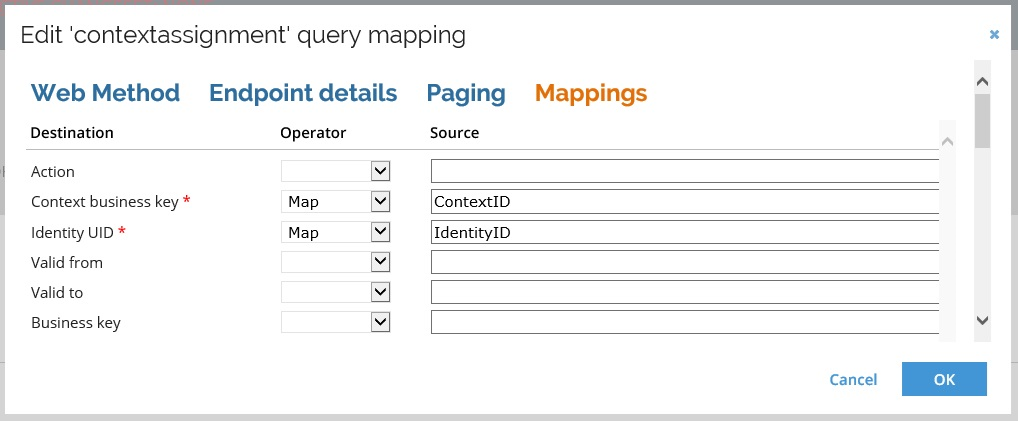Data import
You need to configure the system to contain both Identity data and Access rights if you want to provision identity data to the Workday System. If you are only importing HR information form Workday, select Identity data.
Connection details
| Parameter | Description |
|---|---|
| Endpoint address | Specify the URL of the Workday service to which the connection is made. |
| Timeout in seconds | Specify the preferred connection timeout for one web service call. It is recommended that timeout is not lower than 180 seconds. If the import is not successful and, in the Import execution details, it is stated that the timeout has been reached at Omada.ODW.SOAPCollector, the user increases the timeout value. |
| Content-type header value | Type the value of the HTTP content-type header. For the Workday collector this field should be filled in with "text/xml". |
| HTTP verb | Specify the HTTP request method used by the collector. For the Workday collector this field should be filled in with "POST". |
| User | Type the username for the target system user used to authenticate connectivity. The username format is username@workday_tenant |
| Password | Type the password for the user to authenticate with the service. Each time you make a change to any of the settings in the Connection details dialog box, you must enter the password again. |
| Security protocol | Select the name of the security protocol supported by the external server. It should match the security protocol used in Workday. |
| WS-Security password type | Choose Password Text if you want to use WS-Security authentication. In the case of Workday collector using WS-Security password is mandatory. |
Advanced settings
In Advanced Settings, you can choose whether to perform full or delta import for the following object types:
- Identities, accounts and resources
- Contexts
- Context assignments
- Context owners
- Identity owners
- Resource assignments and resource parent-child relations
- Resource owners
Queries and mappings
Upon onboarding a new Workday system in Omada Identity the queries are partially filled in with pre-defined data. The following predefined queries are provided:
- Identity
- Identity owner
- Context
- Context owner
- Context assignment
You can also add your own custom queries. Each query is defined by a set of parameters. They are divided into five categories: Web method, Endpoint detail, Paging, Delta, and Mappings.
Since Workday enables significant customization, it is highly likely that you will need to make manual changes to the default values, particularly to Alias mapping.
Mapping of resource owners
If you create a query to import resource owners, it is possible to specify the resource's owner in two ways. You can do it either by directly importing the UID of the identity or by specifying the account from which the resolved owner is imported as a resource owner. When mapping directly to the UID of identity, ensure that identities are already imported to Omada Identity.
When mapping to an owned account, it is possible to either specify the business key of the account or the composed business key. The former should be used if the account is in the same system as the resource; the latter should be used if the account is imported into any of the trusted systems.
When the account stems from another system, you should use a Lookup mapping.
Web method
| Parameter | Description |
|---|---|
| WSDL path | Type the URL path to the target system service to which the query is mapped.This parameter needs to be provided manually before the first import is started. |
| Method | Specify the target system method used to extract data. |
| Request XML | Specify the XML request which will be sent to the target system service.This field is automatically filled in when the system is onboarded, however you need to manually provide the service version in <soapenv:Body>.Pressing the Generate XML button resets this field and populates it with an empty XML template for the user to fill in manually. |
| Response XML | You can use this field to help you fill in the Alias mapping.It is filled in with an empty XML template when the Generate XML button is pressed. |
| XPath | You can use this field to help you fill in the Alias mapping.To get the XPath for the desired element (e.g. identity), in the Response XML field, place your cursor in the same line as the opening tag and after the whole element (after > character).Then press the Get XPath button.The XPath is calculated and placed in the XPath field. |
| Entity node XPath | Specify the collection of nodes that represents the entity that we want to import. |
| Alias mapping | Assign aliases (e.g. "firstname", "lastname") to XPath queries used to retrieve Workload data.These aliases will later be used in Workday to Omada Identity data mapping. Due to the HR data storing customization that is allowed in Workday, you might need to define the mapping manually. |
| Filter | This field features a Dynamic Expresso expression that is used for filtering the data imported into Omada Identity.It returns a TRUE/FALSE result for each imported data row.If the expression returns "FALSE" for the given row that row is skipped during import. |
| Description | Type the description of what the query is doing. |
We recommend that you do not change the Paging settings in Request XML.Setting a lower number of objects returned within each response page may significantly impact the performance of the import.
Default Identity web method data
Request XML
The Staffing.Get_Workers WS is used for retrieving Identity data from Workday. The request XML body for Identity by default contains:
<DEFAULT:Get_Workers_Request DEFAULT:version="?">
<DEFAULT:Request_Criteria>
<DEFAULT:Exclude_Inactive_Workers>true</DEFAULT:Exclude_Inactive_Workers>
</DEFAULT:Request_Criteria>
<DEFAULT:Response_Filter>
<DEFAULT:Page>1</DEFAULT:Page>
<DEFAULT:Count>999</DEFAULT:Count>
</DEFAULT:Response_Filter>
<DEFAULT:Response_Group>
<DEFAULT:Include_Reference>true</DEFAULT:Include_Reference>
<DEFAULT:Include_Personal_Information>true</DEFAULT:Include_Personal_Information>
<DEFAULT:Include_Employment_Information>true</DEFAULT:Include_Employment_Information>
<DEFAULT:Include_Organizations>true</DEFAULT:Include_Organizations>
</DEFAULT:Response_Group>
</DEFAULT:Get_Workers_Request>
Alias mapping
By default, the Alias mapping for Identity is defined as follows:
| Mapped alias | Workday data source |
|---|---|
| UID | ./DEFAULT:Worker_Reference/ DEFAULT:ID[@DEFAULT:type='Employee_ID']| ./DEFAULT:Worker_Reference/ DEFAULT:ID[@DEFAULT:type='Contingent_Worker_ID'] |
| Name | ./DEFAULT:Worker_Data/DEFAULT:Personal_Data/ DEFAULT:Name_Data/DEFAULT:Preferred_Name_Data/; DEFAULT:Name_Detail_Data/@DEFAULT:Formatted_Name |
| FirstName | ./DEFAULT:Worker_Data/DEFAULT:Personal_Data/; DEFAULT:Name_Data/DEFAULT:Preferred_Name_Data/; DEFAULT:Name_Detail_Data/DEFAULT:First_Name |
| LastName | ./DEFAULT:Worker_Data/DEFAULT:Personal_Data/; DEFAULT:Name_Data/DEFAULT:Preferred_Name_Data/; DEFAULT:Name_Detail_Data/DEFAULT:Last_Name |
| JobTitle | ./DEFAULT:Worker_Data/DEFAULT:Employment_Data/; DEFAULT:Position_Data/DEFAULT:Business_Title |
| Status | ./DEFAULT:Worker_Data/DEFAULT:Employment_Data/; DEFAULT:Worker_Status_Data/DEFAULT:Active |
| Country | ./DEFAULT:Worker_Data/DEFAULT:Personal_Data/; DEFAULT:Name_Data/DEFAULT:Preferred_Name_Data/; DEFAULT:Name_Detail_Data/DEFAULT:Country_Reference/; DEFAULT:ID[@DEFAULT:type='ISO_3166-1_Alpha-2_Code'] |
| Company | ./DEFAULT:Worker_Data/DEFAULT:Organization_Data/; DEFAULT:Worker_Organization_Data/; DEFAULT:Organization_Data; [DEFAULT:Organization_Type_Reference/@DEFAULT:Descriptor= 'Company']/DEFAULT:Organization_Name |
| ValidFrom | ./DEFAULT:Worker_Data/DEFAULT:Employment_Data/; DEFAULT:Worker_Status_Data/DEFAULT:Hire_Date | ./DEFAULT:Worker_Data/DEFAULT:Employment_Data/; DEFAULT:Worker_Status_Data/DEFAULT:Original_Hire_Date |
| ValidTo | ./DEFAULT:Worker_Data/DEFAULT:Employment_Data/; DEFAULT:Worker_Status_Data/DEFAULT:Termination_Date |
| Category | ./DEFAULT:Worker_Reference/DEFAULT:ID[@DEFAULT:type= 'Employee_ID'] |
| ./DEFAULT:Worker_Data/DEFAULT:Personal_Data/; DEFAULT:Contact_Data/DEFAULT:Email_Address_Data; [DEFAULT:Usage_Data/DEFAULT:Type_Data/;>DEFAULT:Type_Reference/@DEFAULT:Descriptor='Home']/; DEFAULT:Email_Address |
Default Identity owner web method data
Request XML
The Staffing.Get_Workers WS is used for retrieving Identity owner data from Workday. The request XML body for Identity owner by default contains:
<DEFAULT:Get_Workers_Request DEFAULT:version="?">
<DEFAULT:Request_Criteria>
<DEFAULT:Exclude_Inactive_Workers>true</DEFAULT:Exclude_Inactive_Workers>
</DEFAULT:Request_Criteria>
<DEFAULT:Response_Filter>
<DEFAULT:Page>1</DEFAULT:Page>
<DEFAULT:Count>999</DEFAULT:Count>
</DEFAULT:Response_Filter>
<DEFAULT:Response_Group>
<DEFAULT:Include_Organizations>true</DEFAULT:Include_Organizations>
<DEFAULT:Include_Reference>true</DEFAULT:Include_Reference>
</DEFAULT:Response_Group>
</DEFAULT:Get_Workers_Request>
Alias mapping
By default, the Alias mapping for Identity owner is defined as follows:
| Mapped alias | Workday data source |
|---|---|
| IdentityUID | ./DEFAULT:Worker_Data/DEFAULT:Worker_ID |
| OwnerUID | ./DEFAULT:Worker_Data/DEFAULT:Organization_Data/DEFAULT:Worker_Organization_Data/DEFAULT:Organization_Data[DEFAULT:Organization_Type_Reference/@DEFAULT:Descriptor='Supervisory']/DEFAULT:Organization_Support_Role_Data/DEFAULT:Organization_Support_Role[DEFAULT:Organization_Role_Reference/@DEFAULT:Descriptor='Manager']/DEFAULT:Organization_Role_Data/DEFAULT:Worker_Reference/DEFAULT:ID[@DEFAULT:type='Employee_ID'] |
Default Context web method data
Request XML
The Staffing.Get_Organizations WS is used for retrieving Context data from Workday. The request XML body for Context by default contains:
<DEFAULT:Get_Organizations_Request DEFAULT:version="?">
<DEFAULT:Request_Criteria>
<DEFAULT:Organization_Type_Reference DEFAULT:Descriptor="string">
<DEFAULT:ID DEFAULT:type="Organization_Type_ID">
Supervisory</DEFAULT:ID>
</DEFAULT:Organization_Type_Reference>
<DEFAULT:Include_Inactive>false</DEFAULT:Include_Inactive>
</DEFAULT:Request_Criteria>
<DEFAULT:Response_Filter>
<DEFAULT:Page>1</DEFAULT:Page>
<DEFAULT:Count>999</DEFAULT:Count>
</DEFAULT:Response_Filter>
</DEFAULT:Get_Organizations_Request>
Alias mapping
By default, the Alias mapping for Context is defined as follows:
| Mapped alias | Workday data source |
|---|---|
| ID | ./DEFAULT:Organization_Data/DEFAULT:Reference_ID |
| Name | ./DEFAULT:Organization_Data/DEFAULT:Name |
| IncludeManagerInName | ./DEFAULT:Organization_Data/DEFAULT:Include_Manager_in_Name |
| Manager | ./DEFAULT:Organization_Data/DEFAULT:Manager_Reference/@DEFAULT:Descriptor |
| Type | ./DEFAULT:Organization_Data/DEFAULT:Organization_Type_Reference/DEFAULT:ID[@DEFAULT:type='Organization_Type_ID'] |
| SubType | ./DEFAULT:Organization_Data/DEFAULT:Organization_Subtype_Reference/DEFAULT:ID[@DEFAULT:type='Organization_Subtype_ID'] |
| ParentID | ./DEFAULT:Organization_Data/DEFAULT:Hierarchy_Data/DEFAULT:Superior_Organization_Reference/DEFAULT:ID[@DEFAULT:type='Organization_Reference_ID'] |
Default Context owner web method data
Request XML
The Staffing.Get_Organizations WS is used for retrieving Context owner data from Workday. The request XML body for Context owner by default contains:
<DEFAULT:Get_Organizations_Request DEFAULT:version="?">
<DEFAULT:Request_Criteria>
<DEFAULT:Include_Inactive>false</DEFAULT:Include_Inactive>
</DEFAULT:Request_Criteria>
<DEFAULT:Response_Filter>
<DEFAULT:Page>1</DEFAULT:Page>
<DEFAULT:Count>999</DEFAULT:Count>
</DEFAULT:Response_Filter>
</DEFAULT:Get_Organizations_Request>
Alias mapping
By default, the Alias mapping for Context is defined as follows:
| Mapped alias | Workday data source |
|---|---|
| ContextID | ./DEFAULT:Organization_Data/DEFAULT:Reference_ID |
| OwnerID | ./DEFAULT:Organization_Data/DEFAULT:Manager_Reference/DEFAULT:ID[@DEFAULT:type='Employee_ID'] | ./DEFAULT:Organization_Data/DEFAULT:Manager_Reference/DEFAULT:ID[@DEFAULT:type='Contingent_Worker_ID'] |
Default Context assignment web method data
Request XML
The Staffing.Get_Workers WS is used for retrieving Context assignment data from Workday. The request XML body for Context owner by default contains:
<DEFAULT:Get_Workers_Request DEFAULT:version="?">
<DEFAULT:Request_Criteria>
<DEFAULT:Exclude_Inactive_Workers>false</DEFAULT:Exclude_Inactive_Workers>
</DEFAULT:Request_Criteria>
<DEFAULT:Response_Filter>
<DEFAULT:Page>1</DEFAULT:Page>
<DEFAULT:Count>999</DEFAULT:Count>
</DEFAULT:Response_Filter>
<DEFAULT:Response_Group>
<DEFAULT:Include_Reference>true</DEFAULT:Include_Reference>
<DEFAULT:Include_Organizations>true</DEFAULT:Include_Organizations>
</DEFAULT:Response_Group>
</DEFAULT:Get_Workers_Request>
Alias mapping
By default, the Alias mapping for Context is defined as follows:
| Mapped alias | Workday data source |
|---|---|
| IdentityUID | ./DEFAULT:Worker_Data/DEFAULT:Worker_ID |
| ContextID | ./DEFAULT:Worker_Data/DEFAULT:Organization_Data/DEFAULT:Worker_Organization_Data[DEFAULT:Organization_Data/DEFAULT:Organization_Type_Reference/DEFAULT:ID[@DEFAULT:type='Organization_Type_ID']/text()='Supervisory']/DEFAULT:Organization_Data/DEFAULT:Organization_Reference_ID |
Endpoint detail
| Parameter | Description |
|---|---|
| Endpoint address | Populate this field if you want to specify a different Endpoint address than the one specified in Connection details. If the field is left empty the values from Connection details are used as a default. |
| Content-type header value | Populate this field if you want to specify a different Content-type header value than the one specified in Connection details. If the field is left empty the values from Connection details are used as a default. |
| HTTP verb | Populate this field if you want to specify a different HTTP verb than the one specified in Connection details. If the field is left empty the values from Connection details are used as a default. |
Paging
Paging parameters should be set to the following values, where:
- For Get_Workers, [Request_Name] = Get_Workers_Request and [Response_Name] = Get_Workers_Response
- For Get_Organizations, [Request_Name] = Get_Organizations_Request and [Response_Name] = Get_Organizations_Response.
| Parameter | Description |
|---|---|
| Use paging | Decide whether paging will be used when analyzing target system XML requests and responses.In a newly onboarded system it is by default set to Yes. In the case of Workday collector disabling Use paging will result in incomplete imports. |
| Page number XPath (request) | Specify the XPath to page number value in target system request XML. Default XPath: /soapenv:Envelope/soapenv:Body/DEFAULT:[Request_Name]/DEFAULT:Response_Filter/DEFAULT:Page |
| Elements per page XPath (request) | Specify the XPath to elements per page value in target system request XML. Default XPath:/soapenv:Envelope/soapenv:Body/DEFAULT:[Request_Name]/ DEFAULT:Response_Filter/DEFAULT:Count |
| Current page XPath (response) | Specify the XPath to the current page number value in target system response XML. Default XPath:/soapenv:Envelope/soapenv:Body/DEFAULT:[Response_Name]/ DEFAULT:Response_Results/DEFAULT:Page |
| Elements per page XPath (response) | Specify the XPath to elements per page value in target system response XML. Default XPath: /soapenv:Envelope/soapenv:Body/DEFAULT:[Response_Name]/ DEFAULT:Response_Results/DEFAULT:Page_Results |
| Total pages XPath (response) | Specify the XPath to the current page number value in target system response XML. Default XPath:/soapenv:Envelope/soapenv:Body/DEFAULT:[Response_Name]/DEFAULT:Response_Results/DEFAULT:Total_Pages |
Delta
In the delta tab, you can choose if the given request should use the delta import functionality.
| Parameter | Description |
|---|---|
| Use delta | Select whether to use the delta import mode. If you choose "Yes", you will need to fill in the two mandatory XPath fields (listed below). |
| Date From XPath | The XPath to the element in the Request containing the initial date for delta import. |
| Date To XPath | The XPath to the element in the Request containing the final date for delta import. |
Due to the Delta implementation, some import responses can return no results. In some such cases, response may additionally lack an entity node. In consequence, in cases of invalid XPath to the entity node and the empty response, the system will return an empty list and no error or exception will be shown. In the case of no result response, make sure of the correct collector configuration.
Mappings
The Mappings tab lists the mappings of HR data from Workday to Identity data in Omada Identity. It is filled in with default mappings.
Mappings need to match the names defined in Alias mappings. If Alias mappings are customized, Mappings will also need to be modified accordingly. In consequence, you may need to adjust the mapping list manually.
You can remove or modify existing mappings; you can also add additional fields using the Add extension button. For more information on Mappings, see Omada Identity - Import and Onboarding Guide.
Default Identity mapping
The default Identity mapping is set up as follows:
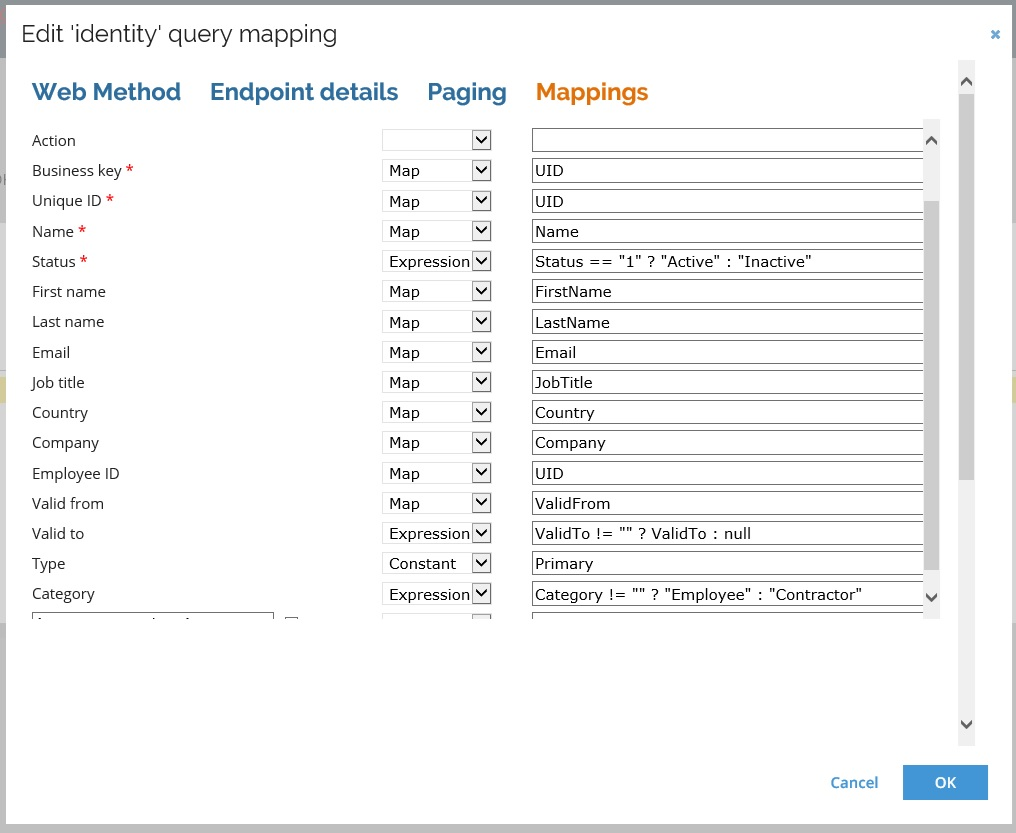
Default Identity owner mapping
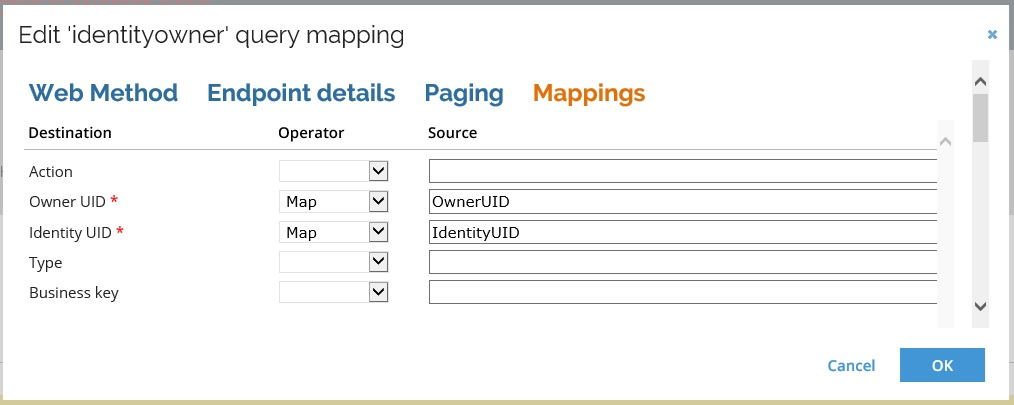
Default Context mappings
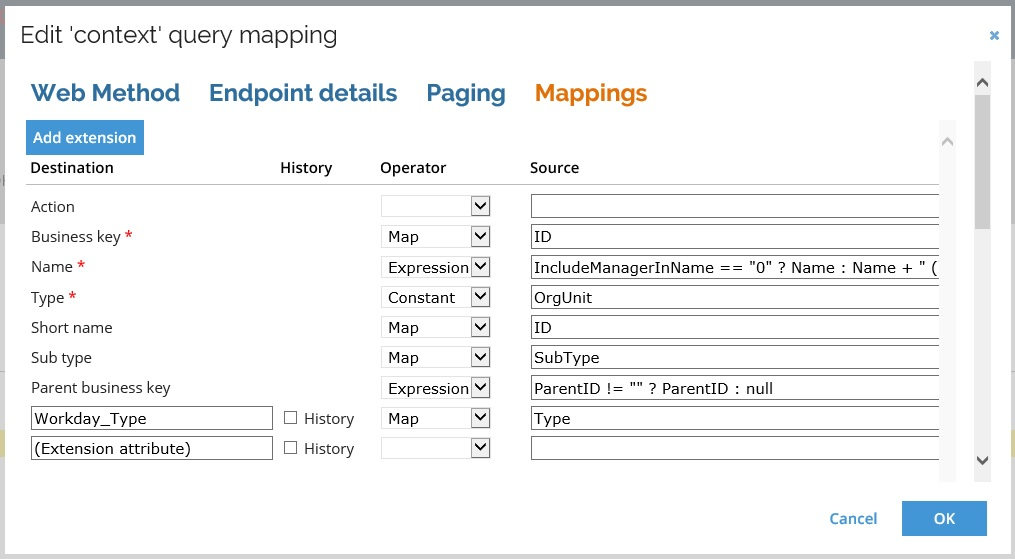
Default Context owner mappings
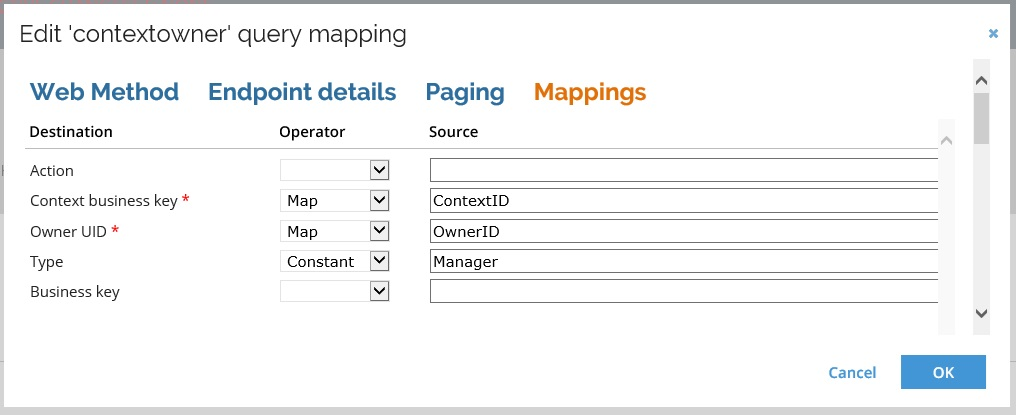
Default Context assignment mappings
